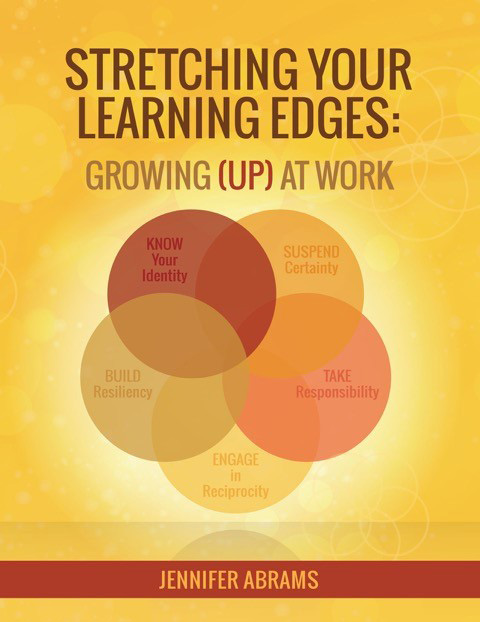
Personal growth animates professional growth; professional growth inspires personal growth. This book offers mindsets and practical resources for guiding and stimulating your learning journey and illuminates the intertwined nature of individual and organizational development. Richly rooted in adult development theories, Jennifer Abrams defines five facets of what it means to grow (up) in a work context: identity, certainty, responsibility, reciprocity, and resiliency. You’ll find rubrics for self-assessment and exercises for each of these qualities interspersed with videos, stories, and quotes that illuminate and educate. This book will reframe your ideas about professional relationships and provide resources for navigating the inner and outer tensions of working productively with teammates and colleagues.
This is a book for self-study and for shared learning with colleagues. It offers a treasure trove of insights, actions, and options for educators seeking greater self-awareness, and increased emotional and mental resourcefulness for meeting the challenges of these demanding times.
“This book is a rich tutorial for anyone seeking to expand the boundaries of their knowledge by learning key capacities that will enable them to more fully engage with others and explore the expansive verges that make us all better. The work is that of a master teacher and capacity builder, a combination of powerful content and reflective exercises that if diligently undertaken will lead you to more of yourself and others.”
Stewart Levine, Founder, ResolutionWorks and author of Getting to Resolution and The Book of Agreement
“I’d vote this book number one for any team committed to developing itself and, refreshingly, individuals within a team. Reporting from a rock-solid foundation of literature on human development Abrams fearlessly approaches five essential areas like identity, certainty, and reciprocity with a surgeon’s skill. Each topic is illuminated with lenses from multiple disciplines. Every chapter provides instruments for teams (or individuals) to guide their reading, assess their edges of learning, reflect and grow. She writes as a fellow learner, “Individual growth is too complex [including hers] to be mandated or “delivered” to a group…” This is a book with which to grow by questioning ourselves and stretching on our own edges.”
Robert J. Garmston, Co-Developer of Cognitive Coaching and The Adaptive School
“Before you read this book decide that you never want to grow up. Now you are perfectly fit for reading and enjoying this book. You will love the five facets of life from ‘know your identity’ to ‘build resilience’. The guiding questions and exercises will keep you exploring and guessing. The video vignettes are warm and wonderful. And when you finish ‘participating’ in the book (which you must do) you will be much wiser about yourself. Best of all, you will realize that you have much more to learn, which come to think of it may be the author’s main point.”
Michael Fullan, Professor Emeritus OISE/University of Toronto
“Jennifer Abrams takes the reader on a humane and growth producing journey of self-exploration to discover one’s leading edge. Full of illustrative clarifications, practical exercises, and reflective prompts, this book becomes a trusted companion to help with the introspective work necessary to create a culture of adult learning that is aspirational. A provocative and positive learning approach that can immediately impact how individuals engage with the world and interact with others.”
Allison Zmuda, Competent Classroom, LLC
“My college days are a distant memory, but I never stopped learning. The easy parts: learning content and skills. The more important and difficult path is looking inside yourself. In Stretching Your Learning Edges: Growing (Up) at Work, Jennifer Abrams shows you how to navigate the inward journey and ultimately turn pro. Here, you will learn the mindset and habits of top performers.”
Danny Bauer, Chief Ruckus Maker, Better Leaders Better Schools
“Rich, resourceful, and relevant! Jennifer Abrams teaches us how to behave and think like cognitively and emotionally mature grown ups and how to keep growing when we think we are finished. In this book, she outlines five facets of being responsible, collaborative, and contributing adults who bring their best self into every aspect of their workplace, community, and family life. She challenges us with a wide array of exercises to engage in to continue to stretch our capacity to show up with positive intentions, open minds, and commitment to be better each day.”
Joellen Killion, Leadership and Learning Consultant
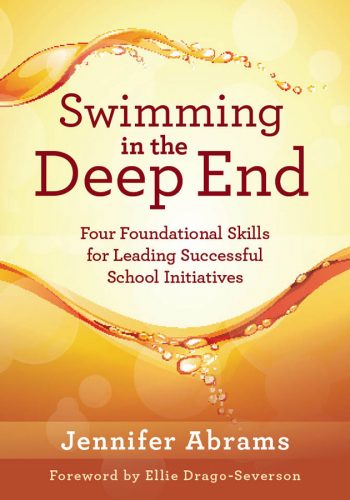
Cultivate the foundational leadership skills you need to enact effective organizational change for school improvement. Utilize the four explored skills to strategically plan school initiatives, have critical conversations, respond to resistance, and manage yourself through change and resistance.
Order Now Inspirational Quotes
Acquire the knowledge and resources necessary to achieve true success as a leader and enact strategic change. In Swimming in the Deep End, author Jennifer Abrams dives deep into the four foundational skills required of effective leadership: (1) thinking before speaking, (2) preempting resistance, (3) responding to resistance, and (4) managing oneself through change and resistance. Throughout the book, readers receive ample guidance for building these vital skills and leading school initiatives that face 21st century challenges head-on.
Develop the educational leadership skills needed to create real change in your school:
Karen Evans from the Teach Better Team gives a video review of Swimming in the Deep End:
Review Excerpt: “If you ever wanted a roadmap for changing our 19th-century educational format to one that meets the needs of our 21st-century students, then Jennifer Abrams has a deal for you!…If you are looking for a guide for this journey, then you will want to buy this book, read and reread it with many highlights and underlines.”
Jim D. Hattabaugh, educational consultant, Fort Smith, Ark.
Review Excerpt: “Jennifer Abrams has given us another gift—Swimming in the Deep End: Four Foundational Skills for Leading Successful School Initiatives. It is, for sure, a gift of love, born from her rich and deep experiences working with leaders in schools, educational systems, health care, and various non-profits around the globe—as coach, international consultant, teacher, leader, and friend. Throughout the book, Abrams encourages us to swim in the deep end by engaging with questions, using protocols, and employing practices she has designed thoughtfully and with dedicated intention. Each step of the way, she offers guidance — a roadmap — for how we can work individually and collectively toward making change by addressing and living the questions, and by learning more about ourselves and each other. Like most endeavors of great value, leading successful initiatives takes time, she explains. It takes hope. It takes trust. It takes patience. It takes care. It takes love. It takes dedication and commitment. It takes all of us. It is this kind of bringing together that Abrams seeks to support and achieve in this important work.”
Dr. Ellie Drago-Severson
Professor of Education
Teachers College Columbia University and Director, Ph.D. Program in Education Leadership
Author of Leading change together: Developing educator capacity in schools and systems
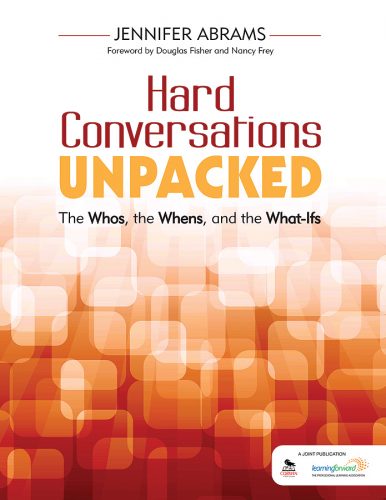
Learn to speak up for what really matters
Tough talks are never easy, but in her best-selling book, Having Hard Conversations, Jennifer Abrams showed educators how to speak intentionally with colleagues about work-related issues through a planned, interactive, and personal approach. In this sequel, she moves readers deeper into the nuances of how to prepare for those conversations while building expectations for positive and meaningful outcomes.
Putting clarity before accountability, or by being clear about what should be understood before going in, can and will increase the favorable results of those tough talks. With an emphasis on what needs to happen before, during, and after hard conversations, this resource explores
Plan for positive outcomes from hard conversations. Let this resource empower you to expect and professionally navigate environmental influences, unexpected pushback, and uncomfortable silences toward real understanding and progress.
Review Excerpt: “In her book Hard Conversations Unpacked: The Whos, the Whens, and the What Ifs, Jennifer Abrams provides anyone who has to have a hard conversation with some practical guidelines so they can be prepared to have a meaningful discussion that will lead to change.” (Read the full review here.)
Mike Janatovich – Principal
Leighton Elementary School, Aurora, Ohio
“Abrams, who cites a broad and current body of literature, provides a valuable rationale for why certain ways of talking are more effective than others.”
Robert J. Garmston – Professor Emeritus & Co-Developer of Cognitive Coaching & Adaptive Schools
California State University, Sacramento
“In order to grow as learners, educators and leaders, we need to be provided with feedback that will enhance our growth. That feedback doesn’t come easily. We shy away from providing honest feedback because we’re afraid it will be “taken the wrong way.” That is why I love Having Hard Conversations 2.0. Jennifer Abrams brings us through the process beautifully with a great deal of honesty, and we can learn a great deal from her insight. This is an important read for anyone in education.”
Peter De Witt – Former School Principal
Finding Common Ground Blog, Corwin
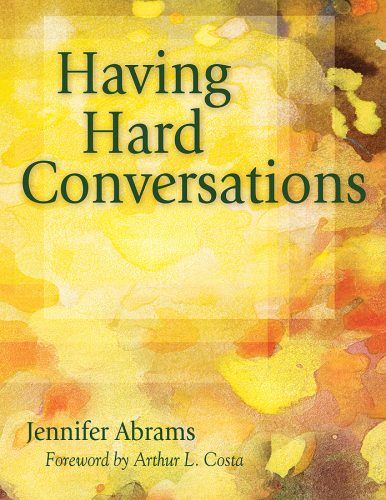
For many educators, confronting a colleague about a work-related issue can be a daunting matter. This insightful book helps educators speak with clarity and courage to directly address difficult situations within their schools.
Having Hard Conversations provides an interactive, personal approach to mastering the art of challenging conversations. The author’s step-by-step strategy addresses a wide range of situations, including communication with supervisees, peers, and supervisors. Emphasizing that initiative and preparation are the keys to a successful conversation, this resource includes:
By addressing important issues directly and professionally, educators can find self-empowerment and promote an open, healthy school environment.
“A thoughtful and practical map for authentically engaging in and learning from having hard conversations. Abrams gently teaches us why having these conversations matter and how they can help us grow. Her work shines light on the landscape of personal and professional learning from engagement in hard conversations.”
Eleanor Drago-Severson, Associate Professor of Educational Leadership, Teachers College, Columbia University
“This book has already changed my life. Just by reading it, my courage to have hard conversations has soared.”
Beth Madison, Principal, George Middle School, Portland, OR
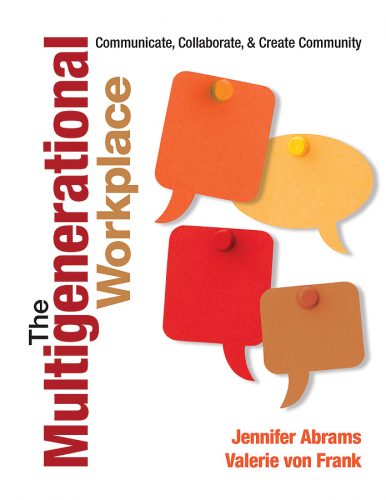
In this book, based on Abrams’ popular workshop, the authors demonstrate how educators can look past their own generational filters to reap the benefits of seeing through a new lens. Focusing on the major contexts in which generational differences play out—including recruitment, coaching, professional learning, and succession planning.
This book offers:
With this honest, practical, and often amusing look at generations at work, you’ll learn to improve communication, retain staff, and look toward succession—a multigenerational plan for school success.
“Few people today are taking on this topic, particularly in the U.S. One of the greatest leadership challenges of this age is how to work across generations. Newer generations are not flawed versions of previous generations—each has its own compelling perspective to contribute. This is the best book to add to an issue that affects all educators and will open up many people’s thinking about leadership.”
Andy Hargreaves, Thomas More Brennan Chair, Lynch School of Education, Boston College, MA
“Readers of The Multigenerational Workplace will be inspired to reflect and respond to the complexities of their workplace and motivate diverse generations for today and into the future. In addition, collaborative teams will find this book useful in enhancing their ability to communicate across generations.”
Clara Howitt, Superintendent of Education/Trustee, Learning Forward
Review Excerpt: “Authors Abrams and von Frank argue that we can all work in the same building, side by side, peacefully and collaboratively, with each group learning from the others with the best interests of the students in mind.” (Read the full review here.)
Linda Biondi, Retired Teacher, Teacher Consultant with the National Writing Project, and Participant on the NJ Department of Education Teacher Advisory Panel
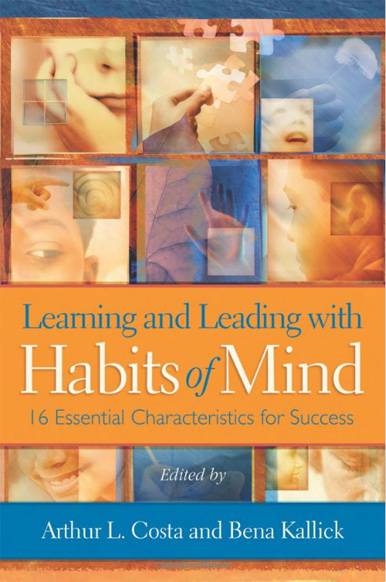
Jennifer was a contributing author for this book. Bringing together all four books in the ASCD ground-breaking Habits of Mind series, this volume presents a compelling case for why it’s more relevant than ever to align the missions of schools and classrooms to teaching students how to think and behave intelligently when they encounter problems and challenges in learning and in life.
Drawing on their research and experience in applying the habits of mind in all kinds of schools, the authors guide you through every step of making intelligent behavior a practical outcome in any school:
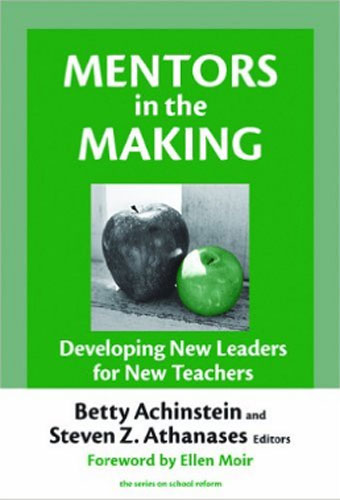
Jennifer was a contributing author for this book. In response to a growing interest in mentoring and new teacher induction, the authors offer a unique view of developing quality mentors. Drawing on empirical research, practitioner action inquiry, and field-tested practices from induction programs, they explore effective mentoring in diverse educational contexts. With richly contextualized and thoughtfully analyzed excerpts from actual mentoring conversations and powerful examples of practice, the volume offers educators, researchers, and policymakers a reform-minded vision of the future of mentoring.
Challenging conventional wisdom—that it is sufficient to identify successful teachers and send them out to mentor others—this essential resource: